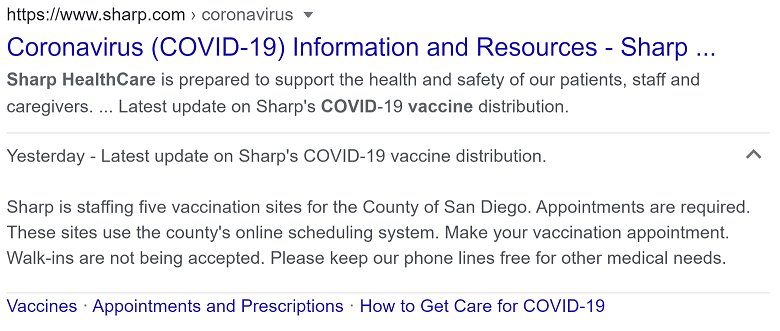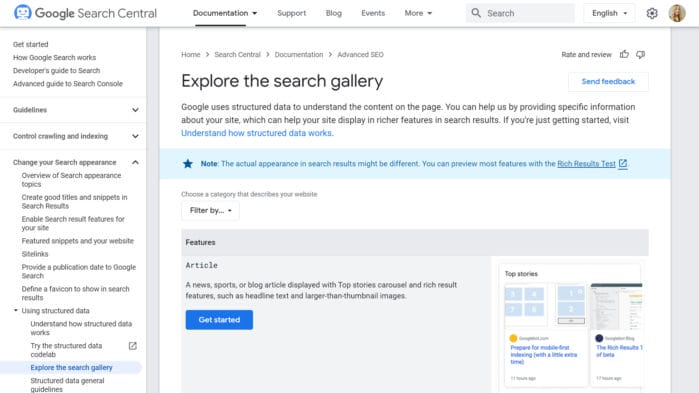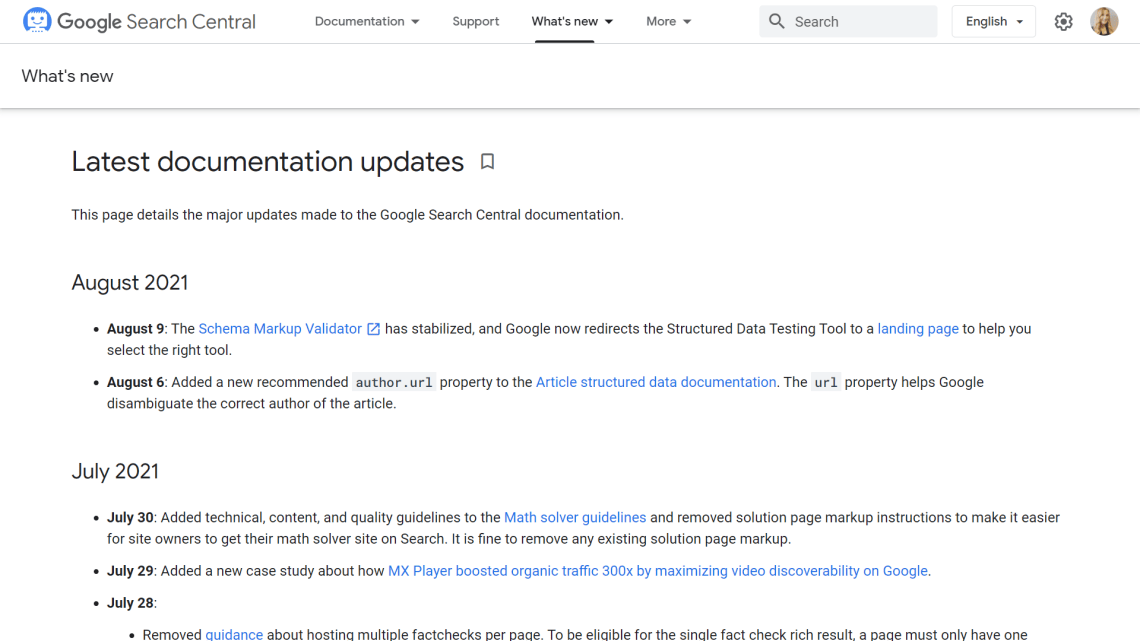Structured data empowers your digital team with the agility to maneuver changing user behavior and a changing organic search environment. When investing in SEO, we are playing by the rules of search engines. That’s why following the best practices set out by Google and other tech giants, such as comprehensive structured data markup, will maximize your SEO results.
Search engine optimization is a long-term investment, but during periods of change in user behavior SEO can also be your greatest short-term ally. Remember that SEO doesn’t just increase traffic to your website; it also drives higher-quality traffic. Users finding their way to your site are interested in what you have to offer because of how you’ve communicated your business in search, underlining how SEO helps you identify more qualified leads for your business.
For example, many patients begin their healthcare journey in Google search. When choosing a provider, they want to know things like the area served, the contact hours, how to book an appointment, and any medical specialties.
With structured data markup, you have more control over what information appears in search engine results pages, and how it appears. This additional information is displayed through enhanced Google search features like rich results, that allow you to stand out from your competition.
What is Structured Data Markup?
Structured data markup is metadata that can be added to the backend of your website. In SEO, this usually refers to Schema.org, a specific structured data vocabulary created by Google, Microsoft, Yandex and Yahoo! back in 2014. This standardized vocabulary is always being updated with new types and properties to categorize and connect data.
The fact that Google continues to invest in schema markup demonstrates that it’s an investment worth making for your website. It essentially provides an enhanced description of your content that allows search engines to relay additional information in search through engaging rich results and other Google features. The more that Google understands, the better it can match your content to a user’s search query.
When getting started, it helps to think of structured data as a way of defining entities across your web pages, and connecting them in a graph. Your homepage will be your primary entity, or entity home, so it’s best to add markup to that page first. Typically, you’ll want to mark up your homepage as either an Organization, LocalBusiness, or a more specific subtype. Our Ultimate How-to Guide for Local Business Schema Markup can help you establish which type to use, and which properties are most useful for describing your homepage.
One of the benefits of LocalBusiness schema is that Google uses the information in your markup to enhance your local Google Knowledge Panel, which is the information box that appears on the right side of desktop search results, and at the top and throughout the search engine results page (SERP) for mobile devices.
Schema Markup Enhances your Google Knowledge Panel
If you’re a small or medium-sized business offering local or essential services, keeping your Google Business Profile (GBP) up-to-date is so important during times of change. Marking up your website with LocalBusiness structured data can also enhance your Google Knowledge Panel. Most consumers don’t become customers immediately, which is why increasing your findability and viewability in search engine page results will help you nurture that customer journey from start to finish.
It’s important to note that there are many subclasses of LocalBusiness schema, including AnimalShelter, ChildCare, Dentist, ShoppingCenter, and more! See the full list in our guide. Try to be as specific as possible when defining your type of business, but if there isn’t an existing type at schema.org LocalBusiness will do just fine.
Demonstrate your credibility by letting customers leave reviews, and then mark up that content with Review structured data while following Google’s structured data guidelines. Here are some important technical guidelines for Review schema markup to keep in mind, pulled from Google’s documentation:
- Mark up an aggregate evaluation of an item with AggregateRating schema
- Refer to a specific product or service by nesting the review in the markup of another schema.org type, like Book or Recipe, or by using a schema.org type as the value for itemReviewed
- Your reviews and ratings should be immediately available to users from the marked up page
- Reviews should be about a specific item, not a category or list of items
- Don’t aggregate reviews from other websites
- For a LocalBusiness or Organization, your markup is not eligible for star review features if the entity being reviewed, aka your local business or organization, controls those reviews. In other words, don’t review yourself and mark those reviews up with structured data!
- Your ratings should be directly sourced from users
- Don’t use human editors to create, curate, or compile ratings or reviews for a local business
Learn more about creating review schema markup in our guide.
You’re building trust and familiarity with your brand, both with your customers and with search engines. Publishing quality content engages and converts more quality leads, and the more engaging touchpoints you have, the more likely quality prospects will get in touch with you.
Diversify Your Rich Results Portfolio
In the height of COVID and vaccinations, people need reliable and up-to-date information. Google introduced the SpecialAnnouncement schema.org type, the markup of which was used for urgent announcements published by locally-oriented organizations such as schools, pharmacies, healthcare providers, community groups, police, and local governments. Learn more about implementing SpecialAnnouncement structured data in our Guide to COVID-19 Structured Data.
On May 20th, 2021, we suddenly saw this type of rich result drop off. That is why we recommend diversifying the rich results that your content is eligible for. We expect medical organizations to create new content that is in line with any changes in the healthcare industry, but making sure that rich result eligibility is part of your content strategy will set you up for success in terms of your search engine optimization performance.
Here is a list of the rich results available through Google’s Search Gallery:
To learn more about each rich result opportunity, click on the links in our list above or explore the Search Gallery here.
It is even possible to achieve more rich result opportunities through multi-type entities. A multi-type entity (MTE) is one entity that is defined using multiple schema.org types (though usually not more than two). Creating a multi-type data item allows you to utilize all the properties available to both types. You may want to create a multi-type entity for your business if, for example, you’re using the Physician Local Business type and want to add alumni information that’s only available to the Person type. To resolve this, your local business would be typed as both Physician and Person.
Diversification of rich results prepares your SEO team to switch focus from one search enhancement to another whenever there are updates to Google’s structured data documentation, demonstrating the agility a robust structured data strategy provides.
Google Continues to Invest in Schema Markup
As we mentioned above, Google continues to demonstrate their investment in schema markup by regularly updating their structured data documentation, and introducing new schema.org properties.
We always get excited about new schema markup properties, because that means more opportunities for our customers to maximize their results from structured data! Your schema markup should stay updated and in line with the visible content on your website, so as not to violate any of Google’s structured data guidelines.
There have already been two hearty schema.org releases this year, but in 2020 we saw eleven releases, so we are expecting many more to come before the end of 2021. Some of our favorites from this most recent release include a number of terms proposed by the Bioschemas project, additions around ecommerce returns and job postings, and the addition of startOffset to the SeekToAction schema.org type for Videos. Read more about this latest release in our news post.
Keeping an eye on new schema.org releases and updates to Google’s structured data documentation will help you diversify your rich result portfolio, as you never know when the next opportunity for your content to stand out in search will come along. Having the foundation in place across your site gives you a head start. Sign up for the Schema App Newsletter to receive regular updates to the schema markup vocabulary and Google’s structured data guidelines.
Example of Healthcare Client being Agile with Structured Data
Here’s an example. One of our healthcare clients is currently restructuring their service lines and simultaneously using structured data to inform their content strategy by targeting different audiences in different geographic locations. This is one way structured data can make your SEO team more agile.
Through structured data, they’re implementing a number of pending schema.org types and properties that were introduced to support medical content. This follows our best practice of diversifying your rich result portfolio by remaining informed of any updates to the schema.org vocabulary.
SEO is especially important for healthcare organizations, as their success relies on how easily users can find them online. In August of 2018, Google rolled out a core update named the “Medic” update, which disproportionately affected sites in the health and wellness vertical as part of a large-scale impact across all verticals. Structured data has become even more strategic for healthcare organizations as they try to regain any SEO ground lost from said update.
How the Schema App Highlighter Increases Your SEO Agility
At Schema App, one of our key values is agility. Technology is advancing quickly, but the ability to be agile means we are prepared for anything at any time. That’s why we created the Schema App Highlighter, a world-class, scalable structured data authoring and management platform.
One of the best parts about the Highlighter is that you don’t need to write a line of code! The tool does it for you at scale and with accuracy. Because the Highlighter is dynamic, any changes made to your content will be reflected in your structured data automatically, and any changes to Google’s Documentation will be reflected in our tools. If you make any changes to your website structure, the Highlighter can accommodate this with ease. You’ll also be working with a schema markup expert from our Customer Success team, who is always up to date with Google’s changes to structured data so you don’t have to be.
We have seen significant increases in how our physicians are being found. Physician bio clips increased 90% from 150,000 clicks to about 285,000 clicks and we saw a 38% increase in the click-through rate of the search results as well”
— Brandi West, Executive Director, Digital Brand & Content Strategy I Digital Marketing, AdventHealth
How does your website content currently look in search results? How do you want it to look? Structured data markup gives you more control over what content appears in search, and how it appears. A diverse portfolio of rich results will empower your SEO team to be more agile, letting them focus on strategy and when/where to add more structured data markup to your website instead of chasing after trending keyphrases for short-term boosts of traffic.
We’ve helped customers across multiple industries diversify their digital strategies with a robust schema markup portfolio, but especially in healthcare where the rich result opportunities are vast, and building trust with patients is important. If you need help getting started with your structured data markup or want to analyze the rich result opportunities on your website, set up a call with our technical experts today!
Are you ready to unleash the power of structured data?

Martha van Berkel is the co-founder and CEO of Schema App, an end-to-end Semantic Schema Markup solution provider based in Ontario, Canada. She focuses on helping SEO teams globally understand the value of Schema Markup and how they can leverage Schema Markup to grow search performance and develop a reusable content knowledge graph that drives innovation. Before starting Schema App, Martha was a Senior Manager responsible for online support tools at Cisco. She is a Mom of two energetic kids, loves to row, and drinks bulletproof coffee.






